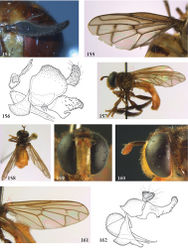Mermerizon inbio
| Notice: | This page is derived from the original publication listed below, whose author(s) should always be credited. Further contributors may edit and improve the content of this page and, consequently, need to be credited as well (see page history). Any assessment of factual correctness requires a careful review of the original article as well as of subsequent contributions.
If you are uncertain whether your planned contribution is correct or not, we suggest that you use the associated discussion page instead of editing the page directly. This page should be cited as follows (rationale):
Citation formats to copy and paste
BibTeX: @article{Reemer2013ZooKeys288, RIS/ Endnote: TY - JOUR Wikipedia/ Citizendium: <ref name="Reemer2013ZooKeys288">{{Citation See also the citation download page at the journal. |
Ordo: Diptera
Familia: Syrphidae
Genus: Mermerizon
Name
Mermerizon inbio Reemer sp. n. – Wikispecies link – ZooBank link – Pensoft Profile
Type specimen
HOLOTYPE. COSTA RICA. Male. Label 1: “COSTA RICA. Prov. Guanacaste, P.N. / Rincón de la Vieja, Send. a las aguas / termales, 900–1000 m, 6–7 OCT / 2001. D. Briceño, Red con Aguamiel. / L_N_305843_392970 #64950”; label 2: “INB0003380896 / INBIOCRI COSTA RICA”; label 3 (red): “Ultimo especimen en / BD A. Lépiz / 2-7-2002” / other side: “?MCR-25”. Coll. INBIO.
Diagnosis
Distinguished from the other two known (yet undescribed) species of Mermerizon by the black pilose mesoscutum.
Description (based on holotype)
Adult female. Body size: 7,5 mm.
Head. Face occupying about 1/4 of head width in frontal view; yellow; yellow pilose, with narrow bare median line on dorsal half. Gena yellow. Frons black; yellow pilose laterally, black pilose posteriorly. Vertex dark yellow, except black at and around ocellar triangle; black pilose. Occiput black, except yellow posteriad of vertex; black pilose on dorsal half, yellow pilose on ventral half. Eye bare. Antennal fossa about as high as wide. Antenna with scape dark brown, pedicel and basoflagellomere yellowish brown; antennal ratio approximately as 4:1:4.
Thorax. Scutum blackish brown, except yellow on notopleuron and around postpronotum and postalar callus; black pilose. Postpronotum, postalar callus and scutellum yellow; black pilose. Scutellum semicircular, without calcars, Anepisternum blackish brown; convex, without sulcus; black pilose on anterior part and along posterior margin, widely bare in between. Anepimeron brown; black pilose on dorsal 1/4. Katepisternum yellow dorsally, brown ventrally; bare. Katepimeron yellow. Katatergum long microtrichose. Anatergum short pale microtrichose. Calypter blackish. Halter yellowish brown.
Wing: hyaline; microtrichose, except bare on cell bc, basal 1/4 of cell br, basal 1/3 of cell bm, anterobasal 1/4 of cell cup.
Legs: Front and mid legs yellowish brown; black pilose. Hind leg blackish brown, except basal 1/2 of tibia and apical four tarsomeres yellowish brown. Front and mid coxae and trochanters yellowish brown; yellow pilose apically. Hind coxa and trochanter dark brown; black pilose.
Abdomen. Tergites and sternites yellowish; yellow pilose, except sternite 1 bare. Genitalia as in Fig. 162.
Female. Unknown.
Etymology
The specific epithet (noun in apposition) is based on InBio, an acronym of Instituto Nacional de Biodiversidad, the Costa Rican institute which holds the holotype of this species.
Original Description
- Reemer, M; Ståhls, G; 2013: Generic revision and species classification of the Microdontinae (Diptera, Syrphidae) ZooKeys, 288: 1-213. doi
Images
|
